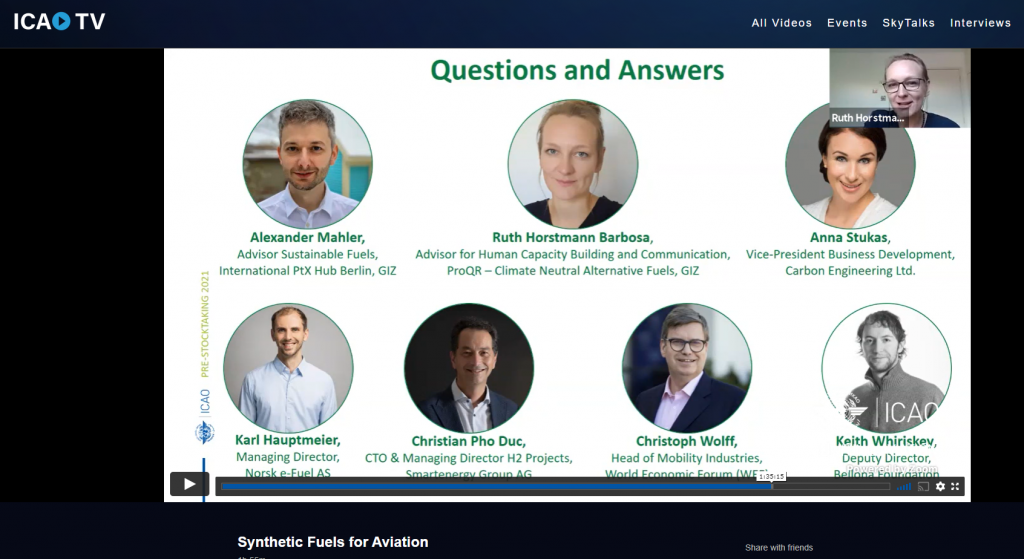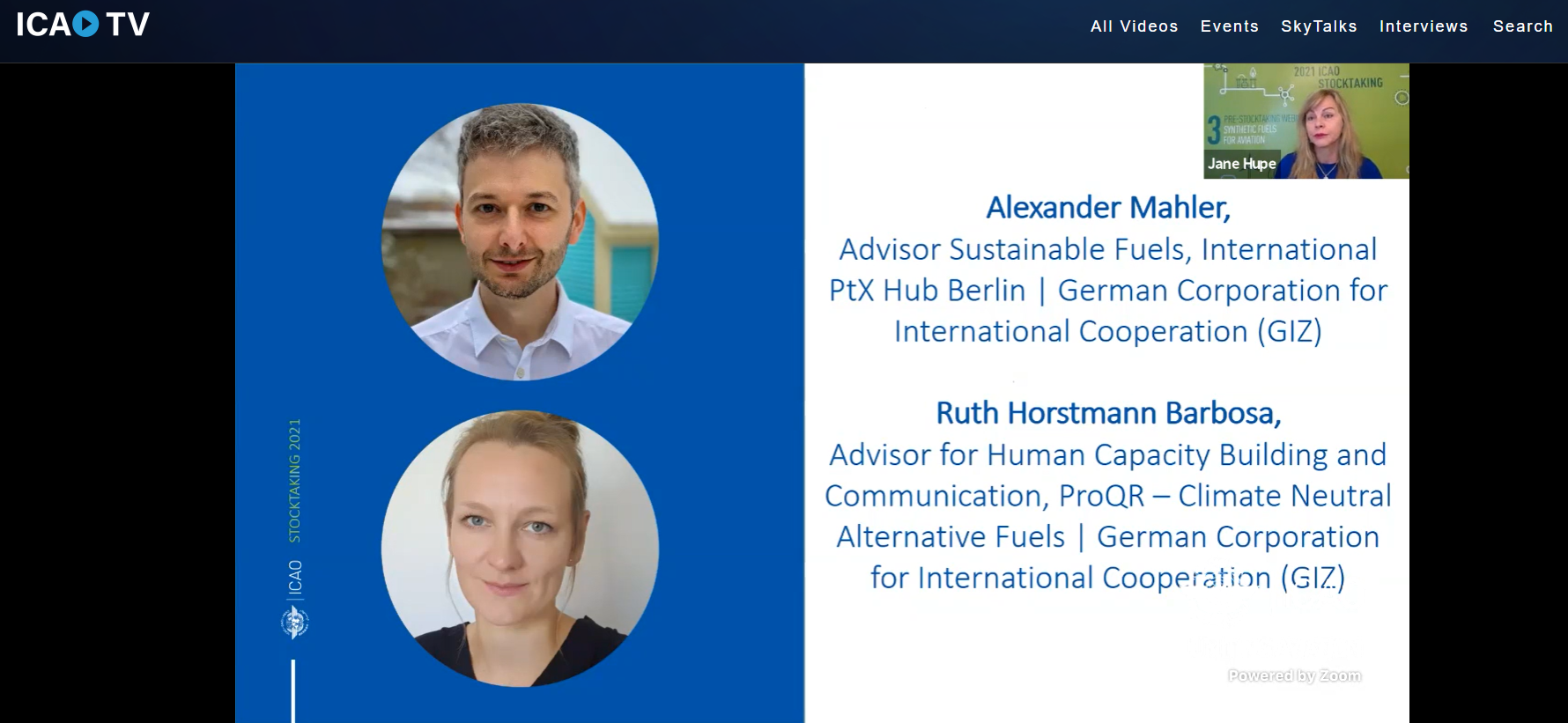Published on May 14, 2021
The International Civil Aviation Organization (ICAO) is currently hosting their pre-stocktaking webinars, a series on sustainable aviation. The webinar on the 6th of May 2021 focused on how to enable sustainable decarbonisation of aviation with synthetic fuels.
The presentations and discussions of the webinar painted a vivid picture of current developments, challenges and potentials of Power-to-Liquid to reduce CO2 emissions in aviation. Leveraging the huge potentials of Power-to-Liquid, promising pilot projects are advancing all around the world: Three months ago, the Dutch airline KLM started the first passenger flight with a blend of 500 litres of synthetic kerosene.
The International Power-to-X Hub Berlin and ProQR Brazil brought sustainability dimensions of Power-to-X to the discussion and presented their pilot project within current dynamics of Power-to-Liquid production in Brazil.
International PtX Hub Berlin: Sustainability Dimensions for Power-to-X
Alexander Mahler, Advisor on Synthetic Fuels at the International PtX Hub Berlin, highlighted the need of a comprehensive sustainability framework for PtL fuels.
In his presentation, he showed the different levels in which sustainability must be effectively addressed. This includes the fuel itself with all its input factors, the production process and value chain, as well as policies on supranational and international levels. At all levels, the right tools must be chosen to ensure sustainability.
He urged supranational and international organisations such as ICAO to set up methodologies and standards, for example on how Power-to-Liquid might be credited and included in schemes such as the Carbon Offsetting and Reduction Scheme for International Aviation (CORSIA). Another issue is how to ensure that non-CO2 climate effects of Power-to-Liquid are also addressed.
However – even though Power-to-Liquid offers huge potentials for reducing carbon emissions in aviation – other instruments such as carbon pricing, efficiency improvements and reducing subsidies are urgently needed as well.
ProQR Brazil: Piloting Power-to-Liquid production at remote airports
Meanwhile, the Brazilian project ProQR is working on piloting sustainable Power-to-Liquid production in remote areas and meeting as many sustainability dimensions as possible.
Ruth Horstmann Barbosa, Advisor for Human Capacity Building and Communication, presented ProQR, which is leveraging the promising conditions for Power-to-Liquid in Brazil: The country already has an 83 % share of renewables in their energy mix, and still further potential to expand renewables. The countries’ dimensions make regional aviation indispensable. There are hundreds of airports in very remote areas, where refueling is currently done uneconomically: Fuel must be transported to remote airports via flights to refuel planes.
Therefore, in those remote areas, local Power-to-Liquid production is economically viable already today. It can foster social and economic development there, too. Brazil further offers strong expertise in producing biofuels with more than 40 years of experience in research and development.
Positive dynamics within Brazil also support the breakthrough of sustainable Power-to-Liquid in the country: In February, the Green Hydrogen Hub in Ceará was launched in an area with huge potential for renewable energy and export opportunities. A National Hydrogen Programme is currently being developed by the federal government.
Especially relevant for sustainable aviation is the Fuel of the Future Programme, which was launched in April. The programme includes measures in research and project financing to explicitly increase the usage of low-carbon and sustainable fuels.
ProQR is both scalable within Brazil and can also serve as a blueprint for sustainable Power-to-Liquid production in other countries.

Bringing multifaceted perspectives on Power-to-Liquid together
The other speakers brought crucial perspectives to the discussion as well:
Anna Stukas from Carbon Engineering Ltd focused on the pivotal role of Direct Air Capture (DAC) for PtL: DAC is used to capture CO2, which is needed to produce PtL fuels.
As many European Union member states have already implemented PtL sub quotas, Karl Hauptmeier from Norsk e-Fuel AS spotlighted the EU as an interesting regulatory market for PtL.
Christian Pho Duc from Smartenergy Group AG took recent dynamics in setting more ambitious emissions reduction targets as an indication of accelerated action in climate protection and appealed to establish an innovative certificate trading system.
Christoph Wolff of the World Economic Forum emphasised the need to consider differences in regional economics: Countries such as Chile, Brazil, Norway and India have great PtL potential due to their low renewable energy production costs, but PtL presents opportunities for any country to profit.
Keith Whiriskey from Bellona Europa highlighted the necessity of using additional renewable energy for PtL production. He also directed attention towards the risk of greenwashing PtL fuel that is produced with CO2 from non-sustainable sources.
Other central challenges were identified by the experts as well: establishing clear roadmaps for mobilising capital, developing financing mechanisms and implementing accounting standards.
